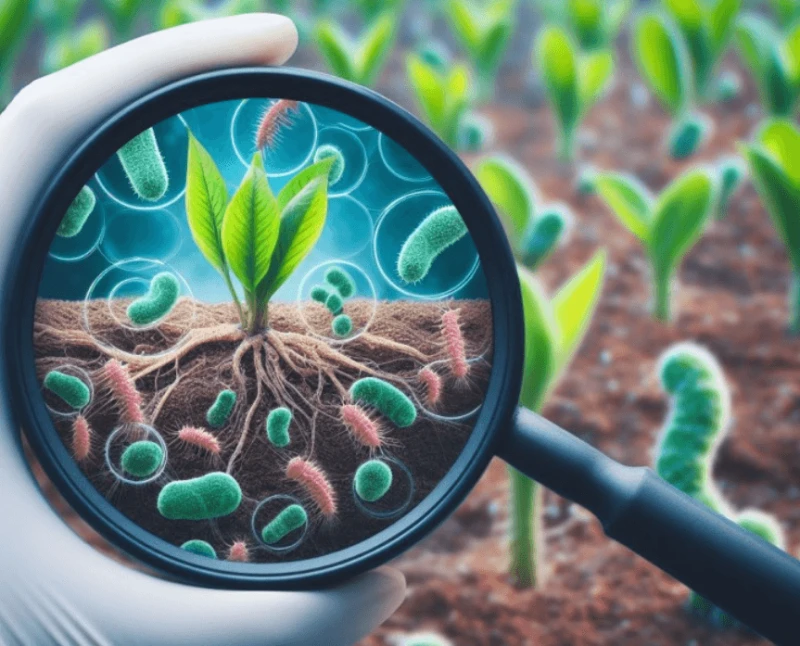Boost to regenerative agriculture: Nanotechnology-enhanced bacterial fertilizer might could reduce farmers’ synthetic chemical dependency
Boost to regenerative agriculture: Nanotechnology-enhanced bacterial fertilizer might could reduce farmers’ synthetic chemical dependency


Claims we may only have 60 harvests left appear to be hyperbole but the fact remains that our agricultural land is suffering due to micronutrient depletion.
Chemical fertilisers are unable to stem the tide, while microbial fertilisers, which replenish the nutrients removed as plants grow, bring with them their own hurdles.
Microbial fertilisers are mostly in use at large-scale commercial farms in Brazil, where farmers have seen equivalent or higher yields, as well as small “boutique” farms in the US. Costs can be prohibitive for many farmers though, with on-site fermenters and skilled staff needed to grow and disperse microbes.
However, Ariel Furst, based in the Department of Chemical Engineering at the Massachusetts Institute of Technology (MIT), US, believes access to microbial fertilisers can be improved through nanotechnology.
“Our goal is to enable everyone to have access to these microbial tools, without needing to actually grow the microbes on site,” she says. Using food-grade chemicals, Furst’s group has developed coatings that can protect the microbes until they are applied to the soil, while enabling transport in a dried form that prevents difficult and expensive liquid transport and avoids the need for cold chain. Comprising a metal and the organic compound polyphenol, the metal-phenol network coatings self-assemble under the right conditions.
This is an excerpt. Read the original post here

 | Videos | More... |

Video: Nuclear energy will destroy us? Global warming is an existential threat? Chemicals are massacring bees? Donate to the Green Industrial Complex!
 | Bees & Pollinators | More... |

GLP podcast: Science journalism is a mess. Here’s how to fix it

Mosquito massacre: Can we safely tackle malaria with a CRISPR gene drive?

Are we facing an ‘Insect Apocalypse’ caused by ‘intensive, industrial’ farming and agricultural chemicals? The media say yes; Science says ‘no’
 | Infographics | More... |

Infographic: Global regulatory and health research agencies on whether glyphosate causes cancer
 | GMO FAQs | More... |

Why is there controversy over GMO foods but not GMO drugs?

How are GMOs labeled around the world?

How does genetic engineering differ from conventional breeding?
 | GLP Profiles | More... |

Alex Jones: Right-wing conspiracy theorist stokes fear of GMOs, pesticides to sell ‘health supplements’




 Viewpoint — Fact checking MAHA mythmakers: How wellness influencers and RFK, Jr. undermine American science and health
Viewpoint — Fact checking MAHA mythmakers: How wellness influencers and RFK, Jr. undermine American science and health Viewpoint: Video — Big Solar is gobbling up productive agricultural land and hurting farmers yet providing little energy or sustainabilty gains
Viewpoint: Video — Big Solar is gobbling up productive agricultural land and hurting farmers yet providing little energy or sustainabilty gains Fighting deforestation with CO2: Biotechnology breakthrough creates sustainable palm oil alternative for cosmetics
Fighting deforestation with CO2: Biotechnology breakthrough creates sustainable palm oil alternative for cosmetics Trust issues: What happens when therapists use ChatGPT?
Trust issues: What happens when therapists use ChatGPT? 30-year-old tomato line shows genetic resistance to devastating virus
30-year-old tomato line shows genetic resistance to devastating virus California, Washington, Oregon forge immunization alliance to safeguard vaccine access against federal undermining
California, Washington, Oregon forge immunization alliance to safeguard vaccine access against federal undermining The free-range chicken dilemma: Better for birds, but with substantial costs
The free-range chicken dilemma: Better for birds, but with substantial costs ‘You have to treat the brain first’: Rethinking chronic pain with Sanjay Gupta
‘You have to treat the brain first’: Rethinking chronic pain with Sanjay Gupta
